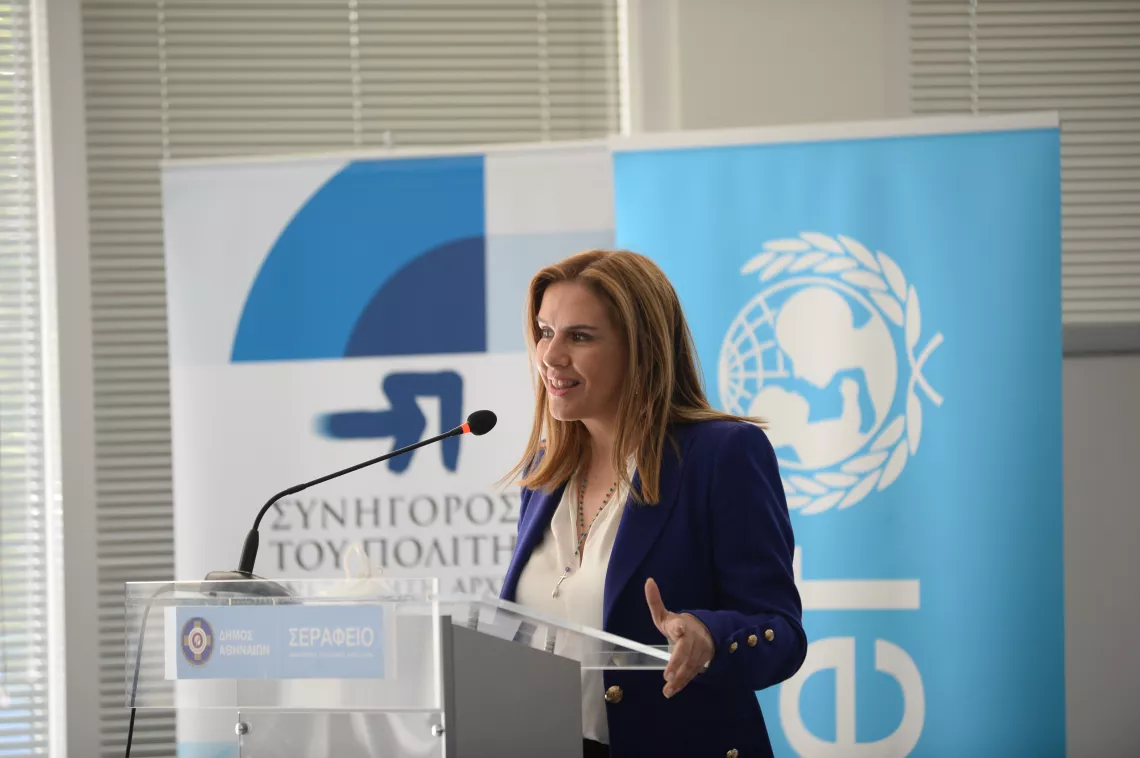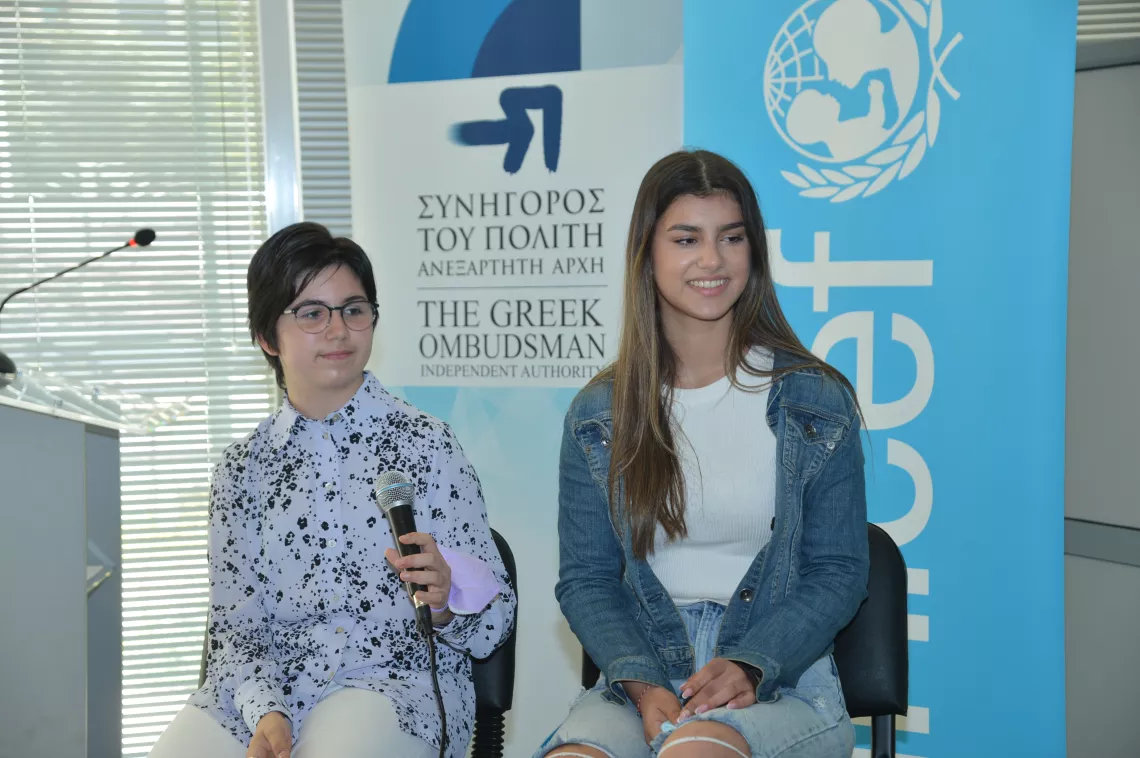The effects of the restrictive measures of the pandemic on children's rights in Greece are devastating, according to a report by UNICEF and the Greek Ombudsman
The report on "The Impact of COVID-19 Restrictive Measures on the Rights of the Child" was presented on Tuesday, April 12 at the Serafeio center of the Athens municipality, documenting the serious consequences of the pandemic for children and young people

- Available in:
- Ελληνικά
- English
ATHENS, APRIL 13, 2022 - The UNICEF Greece Country Office and the Greek Ombudsman presented the report "The Impact of COVID-19 Restrictive Measures on the Rights of the Child" on Tuesday, April 12, at the Serapheio center of the Athens Municipality.
The research on which the report is based was conducted in 2021, in 13 countries simultaneously. In Greece, it was prepared by the Ombudsman in collaboration with the UNICEF Greece Country Office and was based on the analysis of data collected through questionnaires distributed electronically to children, parents, teachers and other professionals active in the field of child protection, as well as in relevant literature, legislation and jurisprudence with reference to the measures enacted in the period of March 2020 - February 2021. The questionnaires were addressed to children of different levels of education, parents/guardians and professionals. 863 people participated in the study, of which 361 were children, 56% girls and 44% boys.
Furthermore, in the individual topics (education, mental health, domestic violence) the minutes and recommendations that emerged from the consultation of the Ombudsman’s Adolescents Advisory Group which worked intensively on the issues of the effects of the pandemic restrictive measures were used, together with the conclusion of the Ombudsman titled "Educational integration of children living in facilities and RICs of the Ministry of Migration & Asylum", published in April 2021.

The results of the research clearly showed that, in the fields of education, mental health and domestic violence, restrictive measures to manage and deal with the pandemic created a series of challenges that significantly affected the lives and health of children.
In education, the curriculum and teaching did not appear to have adapted well to the needs of remote education, while there seems to have been a need for a more interactive and experiential approach for children overall. The exclusion of students from education, due to lack of material and technical infrastructure or the necessary technical knowledge to use it, was also documented. At the same time, teachers did not receive the appropriate support in order to respond to the new conditions and needs that arose. Limited consultations with student communities throughout the implementation of the remote education measure reinforced the feeling of exclusion of pupils and students from the decision-making process concerning them, while the most vulnerable children seem to have been most affected (children of refugee/Roma background, with special educational needs, etc.).
In mental health, lack of direct contact with friends and classmates led to changes in children's behavior, who felt more stressed and displayed behavioral problems, with psychological stress in children increasing significantly from the onset of the pandemic onwards, and especially after the closure of schools. At the same time, children's access to mental health services was more difficult, with about 9 out of 10 parents acknowledging that their children faced challenges in the field of mental health, but did not seek help from specialists.
In relation to domestic violence, it was noted that, in periods of suspension of schools, due to the interruption of contact between children and teachers, social distancing and the limited ability of children to seek help, early recognition of the signs was made impossible. The need to strengthen social services, in collaboration with school units, in order to identify the families that face increased challenges in a timely manner, was also highlighted.
"It is important to establish procedures that will assess the impact on children's rights, in order not only to ensure that draft laws do not adversely affect children's rights, but also to promote their best interests," said the UNICEF Representative in Greece, Mr. Luciano Calestini.
The Assistant Ombudsman for the Rights of the Child, Ms. Theoni Koufonikolakou, also stated: "We are at the crossroads of great change. The deep wounds of the pandemic, the recent war in Ukraine and the emerging economic crisis are likely to lead to an increase in poverty and social exclusion and, consequently, to new, multifaceted and irreversible violations of children's rights."
The event, which was coordinated by Ms. Sofia Paparseni, member of the Ombudsman’s Adolescents Advisory Group 2021, was addressed by the Deputy Minister of Health Ms. Zoe Rapti, the Ombudsman Mr. Andreas Pottakis and the UNICEF Representative in Greece Mr. Luciano Calestini. The methodology of the report was presented by Dr. Antonios Kouroutakis, Assistant Professor at the IE University of Madrid and external collaborator of the UNICEF Greece Country Office for the preparation of the report.

The Assistant Ombudsman for the Rights of the Child, Ms. Theoni Koufonikolakou, presented the main findings and recommendations of the report and the event ended with an open panel discussion in which Ms. Koufonikolakou, Mr. Kouroutakis and Ms. Antigoni Aggelaki, UNICEF’s Child Protection Specialist, answered questions posed by Ms. Sofia Paparseni and Ms. Rozina Bertou, who represented the Ombudsman’s Adolescents Advisory Group.
The Report is available in Greek here.
Media contacts
About UNICEF
UNICEF promotes the rights and wellbeing of every child, in everything we do. Together with our partners, we work in 190 countries and territories to translate that commitment into practical action, focusing special effort on reaching the most vulnerable and excluded children, to the benefit of all children, everywhere.
For more information about UNICEF and its work for children in Greece, visit www.unicef.org/greece.



